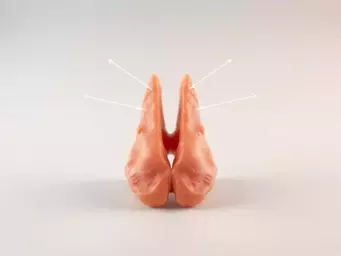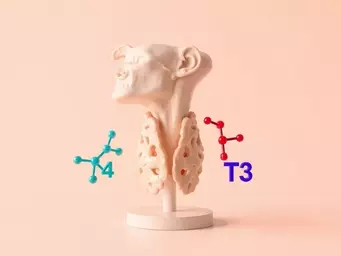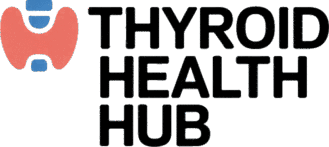Diagnosing Hypothyroidism Symptoms: A Guide
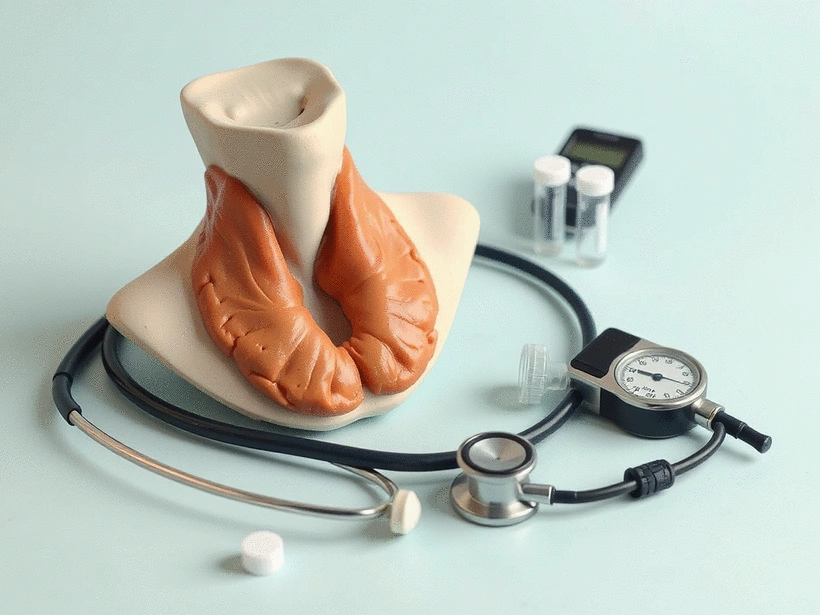
Are you often feeling fatigued, experiencing unexpected weight changes, or battling dry skin? These could be early signs of hypothyroidism, a condition affecting many yet often overlooked. Understanding your symptoms is crucial for early diagnosis and effective management.
What You Will Learn
- Recognizing early hypothyroidism symptoms can lead to timely intervention and treatment.
- Understanding the impact of untreated hypothyroidism on overall health and well-being.
- The importance of monitoring symptoms and maintaining open communication with healthcare providers.
- Debunking common myths surrounding hypothyroidism and its diagnosis.
Hypothyroidism: Early Signs and Impact on Well-being
The visual below illustrates the common symptoms of hypothyroidism, categorized by their impact on physical and mental well-being, highlighting the importance of early recognition.
Physical Symptoms
- •Fatigue & Low Energy
- •Unexplained Weight Gain
- •Cold Intolerance
- •Dry Skin & Hair Loss
- •Muscle Weakness
Mental & Cognitive Symptoms
- •Depression & Mood Swings
- •Memory Problems
- •Difficulty Concentrating
- •Lack of Motivation
Why Early Diagnosis Matters
Untreated hypothyroidism can lead to serious complications including heart problems, infertility, and severe depression.Timely testing and treatment are crucial for better health outcomes.
Understanding Hypothyroidism Symptoms: A Key to Early Diagnosis
Understanding hypothyroidism symptoms is crucial for early diagnosis and effective management. The thyroid gland, a small butterfly-shaped organ in your neck, plays a significant role in regulating your body’s metabolism and energy levels. When it becomes underactive, it can lead to a range of symptoms that often go unnoticed. This is where awareness becomes your best ally—knowing what to look for can help you address potential issues sooner rather than later.
At Thyroid Health Hub, we believe in empowering you with knowledge. Early diagnosis of hypothyroidism not only helps mitigate symptoms but also improves your overall quality of life. Are you ready to learn more about what signals your body might be sending?
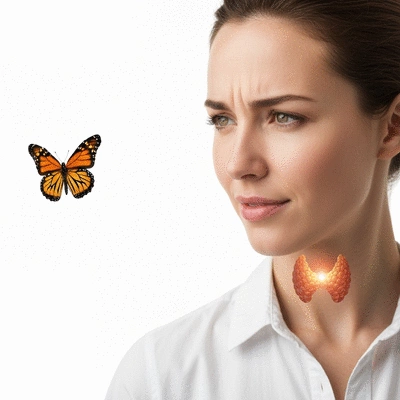
What Is Hypothyroidism and Why Early Diagnosis Matters?
Hypothyroidism occurs when the thyroid gland does not produce enough hormones. This condition can have various causes, including autoimmune diseases, certain medications, or iodine deficiency. Early diagnosis is essential because untreated hypothyroidism can lead to serious complications, such as heart problems, infertility, and severe depression, as detailed by the National Institute of Diabetes and Digestive and Kidney Diseases (NIDDK).
- Understanding your symptoms can lead to timely testing and treatment.
- Getting diagnosed early helps prevent complications.
- It empowers you to take control of your health journey.
Taking these proactive steps not only aids in your health management but also fosters a supportive community of informed individuals who can share their experiences.
Recognizing the Early Signs of Hypothyroidism
Recognizing early signs of hypothyroidism can be challenging, as they often mimic other conditions. However, being aware of these symptoms can make a significant difference in seeking help promptly. Common initial indicators include: fatigue, weight changes, cold intolerance, and dry skin. Each of these symptoms can provide clues about your thyroid health.
Fatigue and Its Implications
Are you often feeling tired, even after a full night's sleep? Fatigue is one of the most common symptoms of hypothyroidism. It can affect your daily activities, leaving you feeling drained and unmotivated. When your thyroid isn't functioning optimally, your body struggles to produce the energy you need. Recognizing this early can prompt you to seek evaluation and necessary treatment.
Weight Changes: Understanding the Connection
Unexplained weight gain or difficulty losing weight can also signal an underactive thyroid. When your metabolism slows down due to low hormone levels, it can become challenging to maintain or lose weight. If you've noticed changes in your weight without any changes in your diet or exercise routine, it may be time to investigate further, as indicated by the American Thyroid Association.
Other Common Symptoms: Cold Intolerance, Dry Skin, and More
Other signs of hypothyroidism may include cold intolerance and dry skin. Do you find yourself feeling colder than those around you? This could be a sign that your thyroid is not producing enough hormones to regulate your body temperature. Similarly, dry skin and hair can indicate a lack of moisture and nourishment from thyroid hormones. If these symptoms resonate with you, consider discussing them with a healthcare provider.
The Role of Depression and Cognitive Function in Hypothyroidism
Depression and cognitive difficulties, like memory problems, may also arise with hypothyroidism. Many individuals don’t realize that these mental health challenges can be linked to an underactive thyroid. If you've been feeling unusually down or have trouble concentrating, it could be related to your thyroid health. Understanding this connection might help you find the right path to recovery.
Identifying Hair Loss and Muscle Weakness as Symptoms
Hair loss and muscle weakness are additional signs that are often overlooked. If you notice thinning hair or feel weaker than usual, don’t dismiss these changes. They could be indicators that your thyroid needs attention. Addressing these symptoms promptly can lead to better overall health and well-being.
Pro Tip
Did you know? Keeping a daily log of your symptoms can significantly enhance your communication with healthcare providers. By documenting when you experience symptoms like fatigue or weight fluctuations, you can help your doctor make informed decisions about your treatment plan, leading to better management of your hypothyroidism.
Empowering Patients: The Next Steps After Diagnosis
Once you've received a diagnosis of hypothyroidism, the journey toward managing your health truly begins. Understanding when to seek medical advice based on your symptoms is crucial. Many patients might feel overwhelmed by their diagnosis, but you're not alone! I encourage you to take an active role in your health by recognizing how your body feels and when to reach out for support.
When to Seek Medical Advice Based on Symptoms
It's essential to stay vigilant about your symptoms after diagnosis. If you notice any significant changes, such as increased fatigue, unusual weight fluctuations, or new symptoms, don’t hesitate to contact your healthcare provider. Early intervention can make a world of difference in managing hypothyroidism effectively!
- Severe fatigue that disrupts daily activities
- Rapid weight gain or loss not explained by diet or exercise
- New mood swings or feelings of depression
- Significant changes in hair texture or density
These signs may indicate that your treatment needs adjustment, or there could be other underlying issues. Empower yourself by staying informed and proactive about your health journey!
Keeping Track of Symptoms for Better Management
Keeping a detailed record of your symptoms can be invaluable in managing hypothyroidism. This practice not only helps you understand your body better but also aids in conversations with your healthcare team. Are you familiar with how to monitor your symptoms effectively? Let’s dive into a simple yet effective method!

Using a Symptoms Checklist for Effective Monitoring
Creating a symptoms checklist can help you track your condition over time. Here are some key components to include:
- Date and time of symptom occurrence
- Description of the symptoms experienced
- Duration and intensity of symptoms
- Any medications taken and their dosages
- Changes in diet or lifestyle during that period
This checklist can be a powerful tool for communicating with your doctor and adjusting your treatment plan as necessary. Remember, you are in control of your health, and having this information at hand can lead to more effective management of your hypothyroidism!
Addressing Common Misconceptions About Hypothyroidism Diagnosis
Despite the growing awareness of hypothyroidism, misconceptions still abound. It's vital to clarify these misunderstandings so you can navigate your health journey confidently. With accurate information, you can make informed decisions about your treatment and lifestyle.
Myths and Facts: Clarifying Misunderstandings
Many patients come to me with questions about what hypothyroidism really means. Addressing these myths can empower you to seek the right care. Here are some common misconceptions:
- Myth: Hypothyroidism only affects older individuals. Fact: It can occur at any age.
- Myth: Weight gain is the only symptom of hypothyroidism. Fact: Symptoms can vary widely, including fatigue and depression.
- Myth: Once diagnosed, you can ignore the condition. Fact: Ongoing management is vital for maintaining health.
Understanding these facts helps dispel fears and prepares you for proactive management of your hypothyroidism.
Frequently Asked Questions (FAQs) About Hypothyroidism
Many patients have questions about the testing process and what it entails. Here are some common FAQs that can shed light on the diagnosis and management of hypothyroidism:
- Q1: What are the most common early symptoms of hypothyroidism?
- A1: The most common early symptoms include fatigue, unexplained weight gain, cold intolerance, dry skin, and hair loss. Recognizing these can prompt early diagnosis.
- Q2: Why is early diagnosis of hypothyroidism important?
- A2: Early diagnosis is crucial because untreated hypothyroidism can lead to serious complications such as heart problems, infertility, and severe depression. Timely treatment improves overall quality of life and prevents these issues.
- Q3: What tests are necessary for diagnosing hypothyroidism?
- A3: Hypothyroidism is primarily diagnosed through blood tests that measure thyroid-stimulating hormone (TSH) levels and, in some cases, thyroid hormone (T4) levels. A high TSH level often indicates an underactive thyroid, as explained by StatPearls.
- Q4: Can hypothyroidism affect mental health?
- A4: Yes, hypothyroidism can significantly impact mental health, leading to symptoms like depression, mood swings, memory problems, and difficulty concentrating. Addressing the physical condition often helps alleviate these mental health challenges.
- Q5: How can I effectively monitor my symptoms after diagnosis?
- A5: Keeping a detailed log of your symptoms, including their date, description, duration, intensity, and any related medications or lifestyle changes, can be very effective. This log helps facilitate better communication with your healthcare provider and aids in adjusting your treatment plan.
Understanding Risk Factors and Their Role in Diagnosis
Lastly, knowing the risk factors for hypothyroidism is crucial. Factors such as family history, certain autoimmune diseases, and previous thyroid issues can increase your chances of developing the condition. By understanding these factors, you become better equipped to manage your health and communicate effectively with your healthcare provider.
Recap of Key Points
Here is a quick recap of the important points discussed in the article:
- Understanding hypothyroidism symptoms is key for early diagnosis and better management.
- Common symptoms include fatigue, weight changes, cold intolerance, dry skin, and hair loss.
- Early diagnosis can prevent serious complications such as heart problems and infertility.
- Keeping track of your symptoms can facilitate better communication with healthcare providers.
- Be aware of misconceptions about hypothyroidism, as they can affect treatment and management.
- Stay proactive about your health by knowing when to seek medical advice based on symptom changes.




